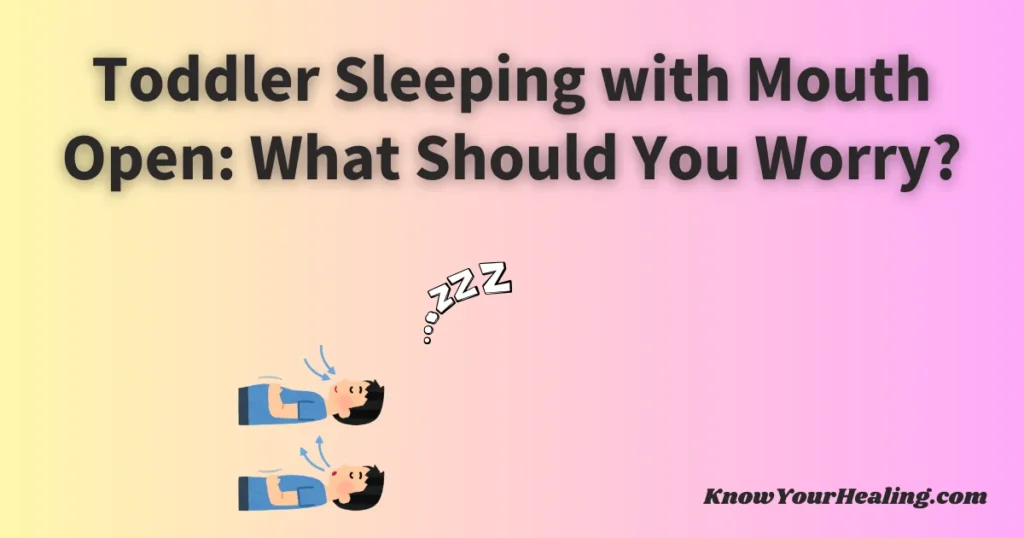Toddler sleeping with mouth open is a common concern for many parents. It can be alarming to notice this in your child, especially if it happens often.
Mouth breathing during sleep might be caused by congestion from a cold or allergies. However, if it persists for over six months, it could indicate underlying health issues.
These issues include sleep disorders, speech development difficulties, and dental problems.
Parents might worry about what this habit means for their toddler’s health and development. Exploring the causes allows you to address any potential problems early on.
For instance, solutions like using a cool-mist humidifier might prove helpful if it’s related to congestion.
Addressing this condition promptly can prevent complications. Mouth breathing can sometimes signal a sleep disorder, so monitoring and consulting a healthcare professional is essential.
Understanding the difference between a temporary condition and a more serious issue is key to ensuring your toddler’s overall well-being.
Toddler Sleeping with Mouth Open: Understanding Toddlers’ Sleep Patterns

Toddler sleeping with mouth open can indicate several issues parents should be cautious about.
Young children often breathe through their mouth due to nasal congestion, which can be caused by a stuffy nose or blocked nasal passages.
Persistent mouth breathing may reduce oxygen intake, leading to restless sleep or daytime sleepiness.
Open-mouth breathing can also affect a child’s oral health. A dry mouth may lead to bad breath and increase the risk of tooth decay.
Chronic mouth breathing might influence facial development, causing changes like a narrow palate or mouth-breathing face. Monitoring for these potential changes is important to prevent long-term health issues.
Improper breathing during sleep might also be a sign of pediatric obstructive sleep apnea. This condition can lead to sleep disturbances and may require a healthcare provider’s evaluation.
Poor sleep quality can also increase the risk factors for speech impediments or behavioral issues in people who breathe through their open mouths.
Addressing the possible causes of mouth breathing, such as a deviated septum or enlarged tonsils, can improve a child’s breathing patterns.
Consulting a pediatric dentist or a child’s doctor for a treatment plan could be the first step toward resolving underlying issues.
They might recommend nasal breathing exercises or other interventions to improve sleep quality. Monitoring your toddler’s sleep and breathing habits closely is crucial for their overall well-being.
Common Causes of Mouth Breathing in Toddlers

Mouth breathing in toddlers can arise due to several factors affecting their upper airway. Addressing these factors is vital for a child’s health and sleep quality. Proper breathing through the nose helps with development and reduces health issues.
Allergies and Congestion
Allergies are a significant cause of nasal congestion in toddlers. When the nasal passages become inflamed or blocked, it’s difficult for toddlers to breathe through the nose.
This often leads to mouth breathing, particularly during sleep. A stuffy nose caused by allergies or colds can also cause restless sleep or daytime sleepiness.
Healthcare providers might suggest using a saline wash or a bulb syringe to clear the nasal cavity, which can help restore nose breathing and reduce symptoms.
Antihistamines are another option to manage allergic reactions. Identifying and avoiding allergens is a crucial first step in reducing nasal congestion and improving a child’s breathing.
Enlarged Tonsils and Adenoids
Enlarged tonsils and adenoids are common in young children and can obstruct the nasal airway, forcing them to depend on open-mouth breathing.
This condition may lead to chronic mouth breathing, which can impact sleep quality and cause behavioral issues due to poor rest.
A pediatric ENT can assess the degree of obstruction and recommend treatment options.
In some cases, surgery might be necessary to remove the tonsils or adenoids.
Persistent mouth breathing due to this obstruction can also affect facial development and increase the risk of dental problems, such as a narrow palate, making early treatment necessary.
Sleep Position and Environment
A toddler’s sleep position can also impact their ability to breathe correctly through the nose.
If a child sleeps on their back or in specific environments, like one with dry air, this might encourage mouth breathing.
A dry mouth is often a result of such positions, and using a humidifier can help maintain moisture in the air.
Adjusting sleep positions can sometimes alleviate issues related to open-mouth breathing. Teaching children to rest on their sides or stomachs could help promote nasal breathing.
Parents should monitor sleeping habits and consult a healthcare provider if problems persist. Changing environmental factors can significantly enhance resting comfort and breathing patterns.
Potential Health Concerns

Children may sleep with their mouths open for various reasons, affecting their health. It is important to consider factors that may impact oral health, sleep quality, and respiratory function.
Oral Health Implications
Open-mouth breathing in toddlers can lead to several oral health problems.
A dry mouth occurs when saliva dries up, increasing the risk of dental issues such as tooth decay and gum disease.
This happens because saliva helps clean the mouth and protect teeth from harmful bacteria.
Both tongue thrust and changes in facial structure may occur, leading to a narrow palate and potentially requiring orthodontic treatment later in childhood.
Regular visits to a pediatric dentist are recommended to monitor oral health.
Early detection and intervention in cases of persistent mouth breathing can help prevent further complications and ensure healthy jaw development.
Sleep Quality and Development
Mouth breathing often disrupts a child’s sleep quality, leading to restless and daytime sleepiness.
A child sleeping with their mouth open might not experience deep, restorative sleep, which can affect child development.
Sleep disorders like obstructive sleep apnoea can emerge as a result of ongoing mouth breathing.
Parents should monitor for signs of sleep disturbance, such as snoring or frequent awakenings.
Discussing these concerns with a healthcare provider may lead to solutions like sleep studies or interventions to improve their child’s nasal breathing and reduce behavioral problems.
Respiratory Infections
Consistent mouth breathing is also related to increased chances of respiratory infections.
The nasal passages usually filter and humidify the air, but mouth breathing bypasses this defense mechanism. This can lead to more health conditions related to the upper airway.
Consultation with a child’s doctor is essential if they consistently breathe through their mouth, especially with symptoms like a blocked nose.
The doctor may identify underlying causes like nasal congestion or a deviated septum and suggest treatment options to improve nose breathing and reduce infection risk.
When to Consult a Professional

A toddler sleeping with their mouth open may indicate an underlying issue. Knowing when to seek medical advice ensures the child’s health and development.
Symptoms to Monitor
Parents should observe specific symptoms if a toddler sleeps with their mouth open frequently.
Nasal congestion or a persistent blocked nose can lead to mouth breathing, as the toddler might struggle to breathe through the nose.
Symptoms such as dry mouth, bad breath, or gum disease could suggest a problem.
A restless sleep pattern or daytime sleepiness might indicate sleep disorders like obstructive sleep apnoea.
Open-mouth breathing can affect the facial structure and lead to dental problems like tooth decay.
Behavioral problems or issues with speech development could also arise from inadequate oxygen intake during sleep.
If these symptoms persist, close attention is needed, as they could impact the toddler’s overall health and development, including the face and jaw shape.
Seeking Medical Advice
Consulting a healthcare provider should be the first step if concerns arise.
A pediatric dentist can check for dental issues connected to mouth breathing. They can provide insights into whether the habit affects oral health or facial development.
If a child snores regularly, a sleep study may be helpful to investigate potential sleep disorders.
A pediatrician can assess any breathing issues caused by anatomical factors, such as a deviated septum or problems with the nasal cavity.
If breathing issues, such as pediatric obstructive sleep apnea, are diagnosed, they may suggest treatment options.
Early treatment can improve the child’s quality of life by addressing upper airway obstructions or providing orthodontic treatment if necessary.
Evaluating a child’s airway health is crucial for ensuring proper breathing and preventing serious effects on their growth and development.
Proper attention from a healthcare provider is paramount for maintaining good health during these crucial early years.
Interventions and Treatments

Addressing a toddler sleeping with their mouth open involves lifestyle changes and medical approaches. Effective interventions can improve nasal breathing and tackle underlying health issues related to open-mouth breathing.
Lifestyle and Home Remedies
Creating a comfortable sleeping environment is a priority for young children experiencing a stuffy nose or nasal congestion.
Using a humidifier adds moisture to the air, helping to ease a blocked nose and reduce dry mouth. Nasal saline sprays or a bulb syringe can help clear a child’s nose, promoting proper breathing.
Pay close attention to oral hygiene to prevent dental problems associated with open-mouth breathing.
Encouraging children to practice nose breathing at a young age can also help prevent a ” mouth-breathing face” and promote facial development.
Medical Treatments
A healthcare provider may explore medical treatments if lifestyle changes do not address the problem.
Conditions like a deviated septum or pediatric obstructive sleep apnea may need intervention.
A sleep study can assess any sleep disorders like obstructive sleep apnoea affecting a child’s breathing.
Persistent mouth breathing can lead to health conditions such as speech impediments.
Consulting a pediatric dentist or an orthodontist may be necessary for issues like tongue thrust or a narrow palate.
In some cases, surgical treatments might be needed for blocked nasal passages. These treatments ensure the child sleeps with an open airway, enhancing their sleep quality and overall health.
Prevention and Best Practices

To help toddlers who sleep with their mouths open, creating a comfortable sleep environment and nurturing healthy breathing habits is essential.
Addressing potential causes like nasal congestion can improve breathing and overall child health.
Creating an Optimal Sleep Environment
A child’s sleeping environment plays a key role in their breathing.
Keeping the room at a comfortable temperature and humidity level helps prevent dry mouth and reduces nasal congestion.
Consider using a humidifier to maintain moisture in the air.
Nasal passages can be cleared with a saline wash or bulb syringe to alleviate a stuffy nose.
Bedding and sleepwear should be made of breathable materials to avoid overheating, which can contribute to restless sleep.
Position the child to sleep on their back to support proper airway alignment.
Monitoring for signs of obstructive sleep apnea and consulting a child’s doctor if issues persist are crucial.
Keeping the sleep environment clean from dust and allergens can reduce irritants affecting airway health.
Healthy Breathing Habits
Encouraging nose breathing is vital for preventing long-term breathing issues.
Parents can teach toddlers the proper breathing technique during daytime activities, ensuring the mouth remains closed.
Practicing these habits early on helps the child’s facial development and prevents problems such as tooth decay and gum disease.
If a child sleeps with a persistently open mouth, it may be due to an upper airway blockage or other breathing issues, such as a deviated septum.
A healthcare provider can assess for chronic mouth breathing and suggest treatment options if necessary.
Regular check-ups with a pediatric dentist can help monitor oral health and address developmental concerns.
Depending on the results, they may recommend orthodontic treatment or other interventions to promote a healthier breathing pattern.
Final Thoughts
Toddler sleeping with mouth open can be a sign of various underlying issues. These range from simple congestion to more serious conditions.
Caregivers should observe this behavior to assess whether it is temporary or persistent. Persistent mouth breathing may require medical attention.
Common causes include nasal congestion from colds or allergies. In many cases, this is temporary. Parents should monitor the situation and consult a healthcare professional if they notice additional symptoms like snoring or restless sleep.
For toddlers, mouth breathing might impact speech development and dental health. It can lead to problems like dry mouth, affecting oral hygiene. A consistent pattern of mouth breathing over an extended time should be discussed with a pediatrician.
Signs to Watch:
- Snoring or noisy breathing
- Restless sleep
- Daytime sleepiness
These signs might indicate that mouth breathing affects sleep quality and should be checked by a doctor.
Mouth breathing in toddlers is sometimes linked to airway issues, which can have longer-term health implications. Specialized health sites like knowyourhealing.com offer information and support for parents dealing with these concerns.
Attention to these details ensures that any necessary interventions are timely. Your awareness and proactive approach can help maintain your child’s overall health and development.




